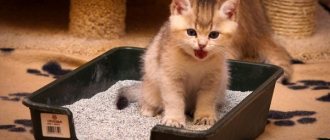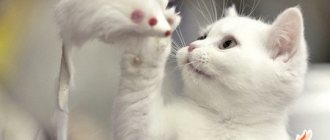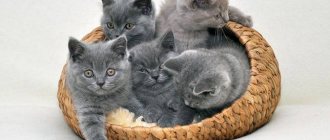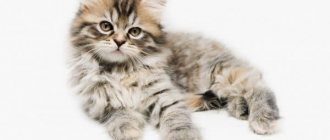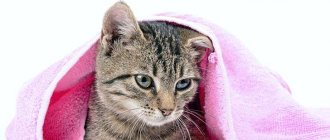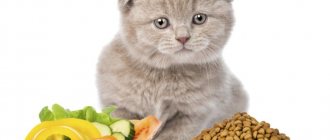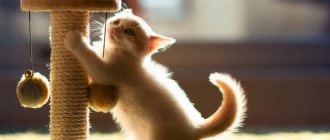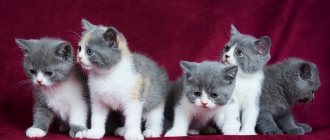Usually everyone is impressed by little newborn bundles of joy. Kittens are born very small, especially if there are three or more kittens in the litter. And how the mother will feed her babies, and how the owners will take care of them in the future, will depend on their weight and general condition.
As a rule, females are very capable and caring mothers, so a lot will depend on the kitten itself and its owners. See the kitten's weight by month in the table.
Newborn kittens weigh approximately 70-125 grams (see table). They are quite helpless, especially the first two weeks. As already mentioned, the weight of the pet may depend on the number of newborns. That is, the fewer kittens are born, the more weight they have.
The weight of the animal always depends on how the mother felt throughout pregnancy, how she ate and how much time she rested.
The first days of a pet's life
In principle, the weight of babies can be determined. For example, in the first weeks , when the baby eats exclusively mother's milk, he gains 10-20 grams per day. In addition, they are still blind, so they move little and are located in the nearest radius of the mother’s nipple.
All this also contributes to weight gain, since the kitten gains calories, but does not spend them anywhere. And small four-legged animals mostly sleep, so up to two weeks of their life they can have a body weight of up to 250 grams.
In order for babies to grow as expected, you should monitor the correct and high-quality diet of the nursing mother. Therefore, do not limit your cat’s food intake, and also buy special specialized food.
By the end of the second week, pets should open their eyes and see all the white light, and their curled ears will straighten. Just at this time, small animals begin to try to move in different directions with their tiny paws.
By the end of this week, the kitten can weigh up to 420 grams. It is during this period, when pets begin to walk, play and frolic, that their appetite awakens, so they begin to gain even more body weight. From the end of the third week, you can try to gradually give the animals complementary foods.
However, it is worth remembering that from the moment you start feeding your little comrades, you should do this with the help of high-quality food. Specially formulated dry or wet kitten foods are best.
You should not buy food from cheap companies, as they contribute to the development of various diseases, for example, urolithiasis.
Why is it important to control your pet's weight?
Caring owners must keep a diary of their kittens' weight from the very first days of their life. This allows you to monitor the development of your pet. It is very difficult to control based on visual parameters: that is why the measurement is based on weight. It is recommended to have accurate electronic scales in the house and weigh babies every day in the first weeks of life, and later - at least once a week. The weight of a newborn baby must be at least 60 grams, otherwise you should immediately contact a veterinarian. Such a baby must be fed with special care in the future.
From the first month of life
In the first month of its life, a pet can gain body weight up to 500 grams. However, this does not mean that if your kitten does not weigh that much, then there is something wrong with him. Usually, purebred and massive kittens, for example, British kittens, gain the most weight. Although in the first month of their life their body weight can reach 700 grams, their development is far behind other breeds.
It is during this period of time that animals need to be accustomed to human communication: petting, picking up, etc. If the pet is not accustomed to this now, then later it will avoid company with people.
At the fifth week, the cat can weigh up to 600 grams. At this age, small animals are already quite independent, so they can be fed fish and meat. To do this, you need to freeze both.
The meat can be served raw, but at room temperature, initially cut into small pieces. It is better to buy sea fish, but if you decide to take river fish, then boil it thoroughly first and also remove all the bones from it.
In the sixth week, cats usually gain another 100 grams in weight. Such pets are already quite active, so they begin to run, jump and play with various objects. A mother cat also actively spends time with her babies and usually already accustoms them to the hunting instinct.
In the second month of their cat's life, pets weigh up to 800 grams. Their teeth are already fully formed. It is in this month, as a rule, that people worm their animals and are also ready to sell or give their babies into good hands. This age is optimal for sale, since the kittens are already independent and can feed without mother's milk.
If you have taken a two-month-old kitten into your home, then remember that for its development and normal weight, it needs varied, nutritious and healthy food. Therefore, before getting a cat, you should think about whether you can provide him with adequate nutrition.
Characteristics of British cats
The British Shorthair cat is valued not only for its cuteness and intelligent, kind look. This “fur” miracle has a calm temperament and good health.
The British are great for business people who spend most of their lives at work.
Pets love to retire for long periods of time so that no one disturbs their sweet sleep. However, this characteristic of a cat being like a teddy bear does not mean that it can be treated like a toy. The Briton will never allow his dignity to be humiliated.
Character and habits of British cats >>
Many owners complain that cats of this breed are unsociable and rarely allow them to be cuddled. But this does not mean that they do not show their love and affection for their owner. It's just that British cats are more restrained in expressing their feelings and are quite self-sufficient, unlike other breeds.
But information about the aristocratic behavior of a Briton from an early age pleases any “cat person.” After all, these pets are very clean and will never allow themselves to relieve themselves in the wrong place. In addition, British cats love to take care of their appearance on their own - they can spend half of their active time on licking and washing themselves in order to always look respectable and radiate charm and charm!
Three months
From this age until six months, small and furry comrades should gain 100 grams per day. It is at this time, and especially if the pet is separated from its mother, that it is very important to feed the pet a balanced diet.
He also needs various vitamins. It is from three months that experts advise owners to finally decide what they will feed their four-legged friend (see the weight of a kitten at 3 months). This can be high-quality dry or wet food or natural food prepared specifically for the animal.
You should not combine both in your diet. If the owners of a kitten buy him premium food, then from it he receives a sufficient amount of essential proteins, fats, minerals and vitamins, so if you feed him something else, this may cause an overabundance of all nutrients. In addition, all this can cause excess weight in a male or female.
Overweight or underweight
It is best to weigh babies at the same time to eliminate errors in determining body weight. Typically, a healthy pet becomes 100 g heavier every week. With a well-designed diet, problems should not arise.
But if, according to the data of the personal diary and the standards of the tablet, it is noticeable that body weight exceeds the norm or is significantly less, the diet should be adjusted. Sometimes kittens experience a short-term stabilization of weight indicators, after which proper weight gain resumes. In rare cases, consultation with a veterinarian may be necessary.
We recommend this article:
How many years do British cats live at home?
Four months
A four-month-old kitten is already a real teenager. Its weight can be up to one and a half kilograms, but the British cat breed can already have a body weight of up to two kilograms. However, this is still approximate data, as already mentioned, everything depends on many facts.
For example, a kitten may not be purebred, but large due to heredity or overeating. In the same way, a massive purebred animal can gain little weight due to stress, illness or poor-quality food.
If your furry friend does not weigh 2 or even 2.5 kilograms at five months, then this is a reason to think, and it is better to immediately seek help from an experienced veterinarian.
British breed standard
Do not forget that no matter how attractive a cat may be, in order to participate in the exhibition he must meet a certain standard.
The standard for each part of the body of a British cat is prescribed taking into account the requirements of the felinological organization in a special document.
WCF standard for British:
- Body. Squat, strong. Medium or large size.
- Head. Rounded, with a wide skull and short neck.
- Ears. Medium size, widely set, rounded.
- Nose. Small size, straight. On the line with the forehead it stands out with a small depression.
- Eyes. Moderately large, widely spaced. Any clearly defined color.
- Tail. Be sure to be short, fluffy at the base and rounded at the tip.
- Wool. Dense, thick, equal length. Has a well developed undercoat.
Other systems may have some differences in the standard, but generally are not very different from a WCF system.
If there are defects such as an elongated tail, thin paws, a body that is too short or a close-fitting coat texture, a British cat may be disqualified from the show. Therefore, to evaluate your pet, visit a special examination before the exhibition, where a specialist will explain in detail the pros and cons of the animal in accordance with the breed.
Six months
A six-month-old Briton should weigh 3 kilograms, other breeds are slightly less. This kitten is entering a new adult phase in its life. In principle, 70% of his main body weight has already been gained! However, the final results will only be formed by the end of two years of their life. By this age, the normal weight of males and females is from 3-5 kilograms (see table of cat weight by age).
Remember that a lot depends on the pet’s owners, but you should not overdo it!
How much should an adult British cat weigh?
You should not think that the weight of an adult British cat does not change. The weight indicators of mature individuals are insignificant, but still increase. Moreover, castrated individuals show a more rapid increase in body weight.
If a non-sterile one-year-old pet has an average weight of 4.5 kg, then a castrato weight norm is 3–6 kg for a female, 5–9 kg for a male.
NOTE! An adult British cat, provided it receives high-quality balanced food, gains weight by 50–100 g per day.
The table shows the normal weight of adult British cats and cats.
| age, years | female, kg | male, kg | height at withers, cm |
| 1 | 2–4 | 4–6 | 15–22 |
| 2 | 2,5–4,5 | 4,5–4,8 | 18–25 |
| 3 | 2,8–4,8 | 4,7–7 | 22–27 |
| 4 | 3,8–5 | 5–7,5 | 25–30 |
| 5 | 4–6 | 5,5–8 | 28–33 |
A healthy British cat should have a proportionate body. The ribs, pelvic and sternum bones should not protrude. The waist in the absence of obesity in British pets is clearly visible. The fat layer is moderate, through it you can feel the abdominal organs and chest.
INTERESTING! British cats with a solid coat color weigh on average more than their patterned counterparts. And this is the breed norm.
Food hygiene
The British are very clean animals and therefore it is necessary to monitor the cleanliness of the bowl from which they eat. It is advisable to wash it daily and try not to use detergents, since the pet picks up the slightest foreign odors and may refuse to eat from poorly washed dishes.
The temperature of the food should not be too hot, but not too cold. From two months of age, you should diversify your diet: introduce cereals, vegetables, milk, dry food, and special canned food.
Upbringing
Before adopting a British breed kitten, it is worth considering that these are wayward animals. Therefore, education should begin from the first days of the kitten’s appearance in its new home. One of the main lessons of education is litter box training. If the kitten does not know that all tasks must be done in a specially designated place, then you need to show him how it is done. If the baby is already trained (usually in nurseries, kittens at the age of 3 months are toilet trained), then you just need to make sure that the pet gets used to the new tray. It is better to immediately show the animal what and how to do, because neglected training will be difficult to correct.
At first, carefully track the kitten’s path to the toilet, so you can teach him to do the necessary things in the right place
During education, force should never be used. British cats are smart, and therefore only a dissatisfied raised tone or clap of the hands can be applied to them, otherwise, when force is used, they can harbor anger or begin to be mischievous. For training, it is better to use repellents with a pungent odor or the smell of citrus fruits, a spray bottle with water, to wean the animal from sharpening its claws on furniture or doing dirty tricks in an inappropriate place.
If the kitten begins to shit, then try to find the reason in the location of the toilet or the composition of the litter
It is also worthwhile to immediately accustom the kitten to the scratching post so that it does not damage the furniture by grinding down its sharp claws. To do this, you need to show the baby several times, running your fingers along the post of the scratching post. You can also use catnip by rubbing dry grass on a post; the smell will attract the kitten’s attention, and he will involuntarily begin to touch the scratching post with his paws.
During games, try to make do with teasers and other toys; do not teach the kitten to play with your hands.
In general, training is not difficult, since the “British” cats are very smart cats, but you should immediately show who is boss in the house by establishing eye contact with the pet, while forbidding him to do nasty things so that he understands the boundaries of what is permitted.
Little “Britons” love to play, so pay more attention to games with your furry fidget
Caring for British kittens
The mother will teach the baby the first hygiene skills. Further, taking care of the appearance and health of the baby rests with family members.
Necessary procedures:
- Cleansing ears and eyes. The condition of the hearing and vision organs is monitored weekly: they are cleaned of dirt and pus. Why British kittens have watery eyes up to 5 months old and how to help them, a doctor at any veterinary clinic will explain. With the process of improving the respiratory system, this unpleasant phenomenon disappears. You should blot your eyes with moistened cotton swabs.
- Combing the fur coat. During the cold season, babies are brushed every week. In summer as needed. Purchase a special metal comb for combing out wool and undercoat. Kittens and older pets usually enjoy the procedure. There is not always time for combing: they find an arch comb. The cat will come up to the arc and scratch its fur.
- Manicure. It is not necessary to take it to the salon; the owner will be able to carefully, carefully, trying not to injure the animal, trim the claw. Start with nail care from 3 months, repeat once every 2 weeks. You need to pick up miniature scissors.
- Bathing the pet. Water procedures are resorted to as the British fur gets dirty. Anti-parasitic agents are also washed off from the hair after treatment. Not all babies love water; sometimes you can get by with dry shampoo.
What to buy
It is necessary to prepare for the arrival of your pet in advance. List of necessary things:
- litter tray, device with low sides. In the future, you can change it to a deeper container so that the cat does not scatter the litter throughout the house;
- scratches, a scratching post is necessary for both the cat and the owner. To prevent the baby from ruining the surface of the furniture, they teach him how to use the item. They sell cool designs with balls;
- toys, for the development and prevention of obesity, the pet needs to actively move: balls, mice, houses with hanging balls, hammocks.
- utensils for eating and drinking.
Limits of normal, underweight and overweight cats of popular breeds (tables)
To determine whether an animal is of normal weight or not, sometimes just looking at it is enough, especially if it is short-haired. The stomach of a cat with a deficiency of body weight is sunken, the ribs, pelvic bones, articulations of the ribs with the thoracic vertebrae and the spine protrude, the muscle and fat layers are practically absent.
Obesity in a cat
An obese pet has a large belly without a hint of a waist and a large muzzle. The bones cannot be felt behind a thick layer of fat.
How to care
The character and characteristics of little British dogs depend on genetic and individual characteristics. By their nature, the British are distinguished by strong immunity and endurance, cats are long-lived. And the health of pets is largely regulated by the care and nutrition of the baby.
Diseases that your pet may be exposed to:
- blindness;
- malocclusion;
- colds;
- skeletal changes;
- deafness;
- cryptorchidism.
In the process of caring for a kitten, helminth prevention and treatment for fleas and ticks should be carried out. The first vaccinations for British kittens begin with the process of getting rid of parasites.
Required vaccinations
To strengthen the immune system and prevent diseases, it is recommended to adhere to the vaccination schedule. At 1.5-2 m, vaccination against helminths is carried out, this is preparation for subsequent vaccinations.
The first vaccinations are given at 2-2.5 months. Vaccination is carried out in 2 stages. After the first stage, 3 weeks pass. This complex vaccination prevents diseases:
- Panleukopenia.
- Calcivirosis.
- Rhinotracheitis.
In the future, this vaccination is carried out once a year. A month after vaccination they are kept in quarantine: they are not taken out of the house.
Mandatory vaccination for British kittens is vaccination against rabies. Placed once a year.
Feeding
British cats are not whimsical and rarely go overboard with their food, but they still need a balanced diet and clean water.
Take the time to create a special diet for them, because the British have a good appetite and are prone to obesity.
If the food consists of natural products, then it is better to feed:
- beef (lean);
- chicken;
- fish (boiled);
- egg yolk;
- dairy products.
Vegetable puree from zucchini or carrots will also work.
From dry food, it is better to choose Super Premium food, as well as canned cat food, according to their age.
For example, many pet stores offer Royal Canin food exclusively for the British shorthair or longhair breed.
The first days of a kitten in the house
The new resident first needs to adapt: find out where the toilet and food are. In addition, he will look for his mother and call her loudly. New smells and new family members frighten the pet, so it will be natural for the baby to hide in a dark place.
How a kitten gets used to a new home goes like this:
- In the first days, you need to leave the kitten alone and try not to forcefully hold it in your hands if it breaks free and avoids attention. It’s better to start getting acquainted with the kitten, communicating with it in a gentle tone, then the pet can overcome fear and meet you halfway. Also, do not make loud, sharp sounds, which can greatly frighten the new tenant;
- provide the opportunity for the baby to gradually master the territory of the new home. To begin with, let the kitten stay in one closed room for several days, where there will be bowls of water, food and a tray. However, the toilet and food should not be located close together; try to place them far away from each other, but not so that the baby cannot find them. After a few days, when the kitten gets used to it, you can let your pet explore other rooms;
It is necessary to get acquainted with the new tenant gradually, without making loud sounds or making sudden movements
- Usually three-month-old kittens have already been trained by a cat to go to the litter box, but stress and new smells can confuse the baby. Therefore, be patient and be vigilant, as soon as the kitten wants to go to the toilet, immediately move it to a new tray and after all the work, do not wash it for a while so that the kitten can recognize the toilet by the smell. It is best to take a little litter from the tray where the kitten went with its mother, this will make getting used to the new toilet easier;
- Feeding your baby should not change dramatically. Ask the breeder what the kitten ate before moving and at first strictly feed the pet the same diet. The change of food should be smooth: you need to gradually mix the new food with the usual one, otherwise the gastrointestinal tract of a small pet may be disrupted.
In a house where there is a kitten there must be a scratching post
Birth
In general, cat pregnancy lasts about 56-63 days. The period depends on the breed for many other reasons. It is impossible to say exactly how long cats are pregnant or how long gestation lasts. Factors influencing duration:
- Weight.
- Presence of previous attacks.
- The relationship between the time of the first estrus and mating.
It is advised to breed a female cat on her third heat, trying to avoid protracted previous periods. If the pet is taken to a partner earlier, the animal will bear kittens for about 50 days. The babies may appear premature or dead.
The weight of the pet is also important when determining the timing of the cat's death. Small beauties, weighing about 3 kg, bear kittens faster, how long do small British cats walk before permission is known. Cubs appear earlier, at 55-56 days. Large adult, sedentary individuals migrate at 64-65 days and can walk beyond the established period.
How many kittens an animal gives birth to depends on the time at which the process occurs; a British cat brings no more than three babies for the first time. Typically, primiparous cats are delivered on time at 63 days. Labor lasts approximately 2 to 14 hours.
Four month old kittens
Kittens at 4 months are already quite large and look like smaller copies of adults. Weight of a British kitten at 4 months:
- 1.7-2.4 for females;
- 2.1-3.9 for a male.
You have already convinced yourself that you have chosen a fairly large breed. The body of four-month-old pets becomes more prominent, the body structure becomes more muscular and squat. The weight of an animal depends not only on nutrition, but also on heredity, therefore, starting from this age, body weight fluctuates within fairly large limits - almost up to 2 kg.
© shutterstock
If the British dog weighs more than 4 kg, this may be a signal that he is overeating, and it is time to reduce the portion of food and add an additional meal, evenly distributing the daily portion into several.
